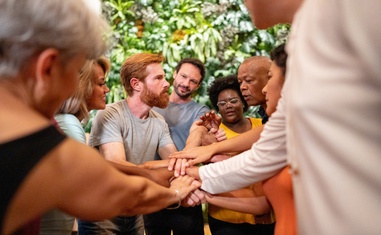The views expressed in our content reflect individual perspectives and do not represent the authoritative views of the Baha'i Faith.
I’ve been a Baha’i since 1982, and 12-step addiction recovery programs have helped me, not only in dealing with addictive behavior but in becoming a better and more aware Baha’i.
Over the years I’ve seen the benefits of free 12-step programs like Alcoholics Anonymous (AA) for those addicted to alcohol, and Narcotics Anonymous (NA) for those addicted to drugs. Likewise, I’ve witnessed beneficial effects for family members using Al-Anon and Adult Children of Alcoholics (ACA) programs.
However, I didn’t know a Baha’i involved in any of these programs until I found 12-step recovery for myself.
RELATED: The 3 Signs that Led Me to a New Spiritual Destination
I’ve since learned that all 12-step programs are based on the set of guiding principles for recovery from addictive, compulsive, or other behavioral problems originally developed by the American founders of Alcoholics Anonymous (AA) in 1935. However, according to the movement’s history, AA actually had its beginnings when the renowned psychotherapist Carl Jung inspired an alcoholic he knew, named Roland H., to seek a spiritual solution for his addiction by sending him to the Oxford Group— a non-denominational, altruistic movement utilizing the spiritual principles of first-century Christianity.
Since then, the 12-step method has been adapted widely for people recovering from various addictions, compulsive behaviors, and mental health problems. Some of these include programs for clutterers, codependents, those with sexual addictions or compulsions, food addicts, overeaters, gamblers, shopaholics, debtors, under-earners, workaholics, media addicts, racists, survivors of incest, and those recovering from mental and emotional illness.
In short, the more I look into trauma and recognize that we are all walking wounded from one trauma or another, I’ve come to believe that addictions are how we make futile attempts to fill the hole in our soul where God wants to reside.
I’ve learned, too, that we could all benefit from the lessons learned from being around people who share the same lived experience. So how do these programs help me become a better Baha’i?
The Baha’i Faith – founded in 1844 and now the world’s second-most widespread religion – provides me with a spiritual foundation and framework for living a purposeful life, while 12-step recovery offers a structured path to overcoming the veils between me and God. Both foster personal transformation.
The Baha’i Faith and 12-step recovery programs share some common principles and values that can complement and enhance one another. Some of these include:
1. Developing Humility and Self-Awareness
One of the fundamental steps in both 12-step recovery and in the Baha’i Faith is acknowledging my powerlessness and turning to God for help. Developing and strengthening my relationship with the Creator is one of the primary purposes of a Baha’i life. I admit my powerlessness every day when I say the Baha’i short obligatory prayer from Baha’u’llah:
I bear witness, O my God, that Thou hast created me to know Thee and to worship Thee. I testify, at this moment, to my powerlessness and to Thy might, to my poverty and to Thy wealth. There is none other God but Thee, the Help in Peril, the Self-Subsisting.
Another common element of 12-step recovery – taking a fearless moral inventory of my character defects – can also be framed as calling myself to account each day, as the Baha’i writings recommend. This process fosters humility and self-awareness — spiritual qualities highly valued in the Baha’i Faith. By recognizing and addressing my own shortcomings, I can better align myself with Baha’i teachings, and develop inner virtues, another important purpose of a Baha’i life.
In a speech he gave in Illinois in 1912, Abdu’l-Baha had this to say about the development of virtues:
The purpose of the creation of man is the attainment of the supreme virtues of humanity … We must strive with energies of heart, soul and mind to develop and manifest the perfections and virtues latent within the realities of the phenomenal world.
2. Surrendering to the Will of God
Both the Baha’i Faith and 12-step recovery emphasize the importance of surrendering my will to a higher power. In 12-step programs, this surrender is a central aspect of recovery. For Baha’is, it aligns with their belief in the all-powerful and loving nature of the Creator. My favorite Baha’i prayers help me detach from my own will and turn instead to the Will of God:
I have renounced My desire for Thy desire, O my God, and My will for the revelation of Thy Will. By Thy glory! I desire neither Myself nor My life except for the purpose of serving Thy Cause, and I love not My being save that I may sacrifice it in Thy path.
Make me ready, in all circumstances, O my Lord, to serve Thee and to set myself towards the adored sanctuary of Thy Revelation and of Thy Beauty. If it be Thy pleasure, make me to grow as a tender herb in the meadows of Thy grace, that the gentle winds of Thy will may stir me up and bend me into conformity with Thy pleasure, in such wise that my movement and my stillness may be wholly directed by Thee.
3. Practicing Forgiveness and Making Amends
Forgiveness and making amends represent key elements in both the Baha’i teachings and in 12-step recovery.
The Baha’i writings contain extensive advice about forgiveness – forgiveness of others, of myself, as well as God’s forgiveness of us all. Unlike some religions, though, Baha’is ask forgiveness from God directly, as this passage from Abdu’l-Baha:
O Lord of forgiveness and pardon! Forgive our sins, pardon our shortcomings, and cause us to turn to the kingdom of Thy clemency, invoking the kingdom of might and power, humble at Thy shrine and submissive before the glory of Thine evidences.
In 12-step recovery programs, the eighth and ninth steps involve making a list of individuals I have harmed, and making direct amends to them wherever possible. In 1973, the Universal House of Justice wrote:
… if we spontaneously desire to acknowledge we have been wrong in something and that we have some fault of character, and ask another person’s forgiveness or pardon, we are quite free to do so.
4. Selfless Service to Others
Service to others is a cornerstone of the Baha’i Faith, and is also strongly encouraged in Step 12 of 12-step recovery, through sponsorship and helping newcomers. Engaging in service can strengthen my sense of unity with others and reinforce the Baha’i principle of working towards the oneness and betterment of humanity.
RELATED: The 7 Stages of Spiritual Growth and Development
5. Building a Supportive Community
Both the Baha’i Faith and 12-step recovery programs emphasize the importance of community and fellowship. By participating in 12-step meetings, I can build a supportive network of people with lived experience, who understand the challenges of overcoming ineffective coping mechanisms and the value of spiritual growth. This sense of community can complement my involvement in Baha’i activities and provide additional sources of encouragement and support. There are many opportunities in the Baha’i Faith for me to engage in community building – home visits, devotional gatherings, participating in community Feasts and Baha’i Holy Days.
Engaging in 12-step recovery has significantly enhanced my practice of the Baha’i Faith by deepening my relationship with God, fostering various virtues, and strengthening my connection to Baha’i principles. The shared values of detachment, forgiveness, service, and community-building provide a strong foundation for my personal growth and a deeper understanding of both paths. By integrating the principles of 12-step recovery into my Baha’i journey, I am becoming a better Baha’i, living more fully in alignment with the teachings and values of my faith while finding healing and transformation in the process – and I am grateful!

















Comments
Sign in or create an account
Continue with Facebookor